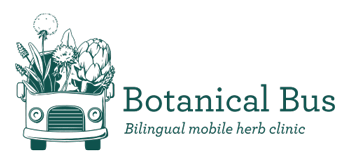(Español abajo)
This fall The Botanical Bus: Bilingual Mobile Herb Clinic is coming together with Lideres Campesinas, Nuestra Comunidad and La Plaza: Nuestra Cultura Cura in the organization of a farmworker clinic.
In Sonoma County, Latine residents make up 1/3 of the population and almost 80% of COVID-19 infections. Our most vulnerable essential farmworkers, domestic workers and day laborers face overcrowded living conditions, unsafe work environments and limited access to financial relief and medical care. Without an intervention, infection rates will increase as farmworkers and other low-wage, immigrant workers experience higher rates of co-morbidities for COVID-19, such as asthma, diabetes, obesity, heart disease, stress, hunger and malnutrition.
In the face of this disproportionate, deepening health crisis, we will organize 20 clinics over 12 weeks of grape harvest at vineyard worksites, day labor street corners, COVID-19 testing sites and family resource centers throughout Sonoma County. The mobile clinic will provide 500 Latine immigrant farmworkers, domestic workers and day laborers with:
- Herbal care kits for immunity, stress relief and respiratory health
- COVID-19 personal protective equipment and hand sanitizer
- Evacuation kits and emergency preparedness trainings
- Manual pain therapy including massage and acupuncture
- Tamales and medicinal herb agua frescas
The Farmworker Clinic will engage promotora community health workers in the establishment of trust and culturally relevant care. We will provide a comprehensive health resource referral guide to connect our Latine community with long-term, continuous care and ongoing opportunities for empowerment.
See our clinic schedule
We invite you to take ACTION today!
- Our community can support our work with fiscal and in-kind donations
- Sonoma County vintners can partner with us to host a clinic at your vineyard
- Holistic health practitioners and translators can sign up for a shift to volunteer your services
- Farmworkers, domestic workers and day laborers you are always essential and we are here for you
Please email at info@thebotanicalbus.org for more information. Thank you for rising up as a leader in our community and taking action to get our bilingual mobile herb clinic on the road!
Este otoño, The Botanical Bus: Bilingual Mobile Herb Clinic se unirá con Lideres Campesinas, Nuestra Comunidad y La Plaza: Nuestra Cultura Cura en la organización de una clínica para trabajadores agrícolas.
En el condado de Sonoma, los residentes latine constituyen 1/3 de la población y casi el 80% de las infecciones por COVID-19. Nuestros trabajadores agrícolas, domésticos y jornaleros más vulnerables se enfrentan a condiciones de vivienda abarrotada, entornos laborales inseguros y acceso limitado a asistencia financiera y atención médica. Sin una intervención, las tasas de infección aumentarán a medida que los trabajadores agrícolas y otros trabajadores inmigrantes de bajos salarios experimenten tasas más altas de comorbilidades por COVID-19, como asma, diabetes, obesidad, enfermedades cardíacas, estrés, hambre y desnutrición.
Frente a esta crisis de salud desproporcionada y cada vez más profunda, organizaremos 20 clínicas durante 12 semanas de cosecha en los viñedos, las esquinas de los jornaleros, los sitios de prueba de COVID-19 y los centros de recursos familiares en todo el condado de Sonoma. La clínica móvil proporcionará a más de 500 trabajadores agrícolas, trabajadores domésticos y jornaleros latinos inmigrantes:
- Botiquínas herbales para la inmunidad, el alivio del estrés y la salud respiratoria
- Equipo de protección personal COVID-19 y desinfectante de manos
- Entrenamientos de preparación para emergencias
- Acceso a terapia manual del dolor, incluidos masajes y acupuntura
- Tamales orgánicos y agua fresca de hierbas medicinales
La Clínica Campesinx involucrará a las promotoras de salud en el establecimiento de confianza comunitaria y cuidado culturalmente relevante. Proporcionaremos una guía de referencia de recursos de salud integral para conectar a nuestra comunidad Latine con cuidado continua a largo plazo y oportunidades continuas de empoderamiento.
!USTED puede tomar acción hoy!
- Nuestra comunidad puede apoyar nuestro trabajo con donaciones fiscales y de suministros www.thebotanicalbus.org/donate
- Los productores de uva del condado de Sonoma pueden asociarse con nosotros para organizar una clínica en su viñedo
- Los traductores y profesionales de la salud integral pueden inscribirse en un turno para ofrecer sus servicios como voluntarios
- Trabajadores agrícolas, trabajadores domésticos y jornaleros, ¡ustedes siempre son esenciales y estamos aquí para ayudarles!
Envíenos un correo electrónico a info@thebotanicalbus.org para obtener más información. ¡Gracias por levantarse y tomar acción para poner en marcha nuestra clínica móvil bilingüe de hierbas!



